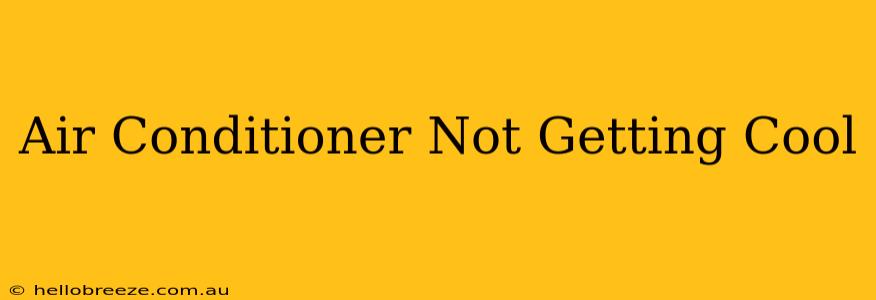Is your air conditioner blowing warm air instead of the cool relief you crave? Don't sweat it! A malfunctioning AC unit is a common problem, but often fixable without calling a costly professional. This guide will walk you through troubleshooting steps to diagnose and potentially solve why your AC isn't getting cool.
Common Reasons Why Your AC Isn't Cooling
Several factors can contribute to an air conditioner's inability to produce cool air. Let's explore some of the most frequent culprits:
1. Dirty Air Filter:
This is the easiest and most common fix. A clogged air filter restricts airflow, forcing your AC unit to work harder and potentially overheat. This leads to reduced cooling capacity or even complete failure to cool.
- Solution: Check your air filter (usually located on the return air vent). If it's dirty or dusty, replace it with a new one. This simple act can often resolve the problem immediately.
2. Frozen Evaporator Coil:
A frozen evaporator coil is a serious issue that prevents proper cooling. This often happens due to:
-
Restricted Airflow: A dirty air filter, clogged vents, or blocked condenser coils can cause freezing.
-
Low Refrigerant: Insufficient refrigerant makes the coil work harder, leading to ice formation.
-
Faulty Fan Motor: If the fan isn't circulating air properly, the coil can freeze.
-
Solution: Do not attempt to thaw the coil yourself using a hairdryer or other heating methods. This can damage the unit. Instead, turn off the AC and allow it to thaw naturally. Once thawed, inspect for the underlying cause (dirty filter, low refrigerant, fan issues) and address those issues accordingly.
3. Refrigerant Leaks:
Refrigerant is the crucial component that facilitates cooling. Leaks cause a significant reduction in cooling capacity or complete failure. This requires professional attention.
- Solution: You cannot safely repair a refrigerant leak yourself. Refrigerant handling requires specialized tools and knowledge. Contact a qualified HVAC technician to diagnose and repair the leak.
4. Condenser Coil Problems:
The condenser coil releases heat outside. Dirty coils restrict airflow, reducing efficiency and cooling power.
- Solution: Clean the condenser coils (located outside your home) with a coil cleaning brush or a garden hose. Be gentle to avoid damaging the fins.
5. Electrical Issues:
Problems with the electrical components (wiring, capacitor, compressor) can prevent your AC from working correctly. These issues require professional diagnosis and repair.
- Solution: Do not attempt to repair electrical components yourself. Contact a qualified HVAC technician.
6. Compressor Failure:
The compressor is the heart of your AC unit. A malfunctioning compressor means no cooling. Compressor failure often requires replacement and professional service.
- Solution: Contact a qualified HVAC technician for diagnosis and repair.
Preventing Future AC Problems: Maintenance is Key
Regular maintenance is crucial to ensuring your AC unit operates efficiently and effectively. This includes:
- Regular filter changes: Aim for changing your filter every 1-3 months, depending on usage and environment.
- Annual professional inspection: Schedule an annual inspection by a qualified HVAC technician. This allows for early detection of potential problems and prevents costly repairs down the line.
- Cleaning condenser coils: Clean the condenser coils at least once a year, more often if located in a dusty or dirty environment.
By following these troubleshooting tips and practicing preventative maintenance, you can keep your air conditioner running cool and efficiently for years to come. Remember, when in doubt, it’s always best to contact a professional HVAC technician. They have the expertise and tools to diagnose and repair more complex issues.

